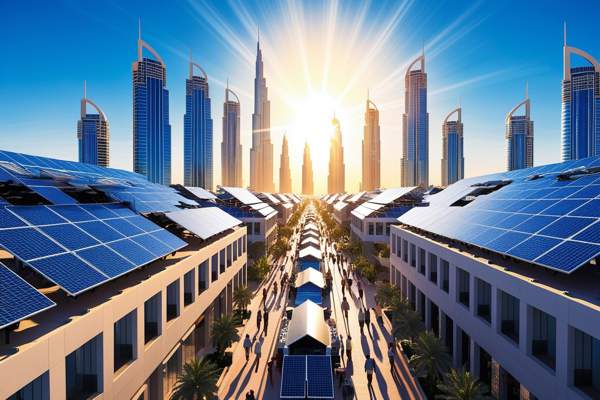
The Overlooked Energy Asset Dubai's Rooftops
Dubai's skyline, characterized by its impressive array of buildings, presents a significant yet largely untapped resource for clean energy generation rooftops. These expansive surfaces, often exposed to the region's abundant sunshine, hold immense potential for harvesting solar power directly at the point of consumption. Unlike large-scale solar parks that require vast tracts of land, rooftop solar installations can be seamlessly integrated into the existing urban fabric, transforming buildings from mere energy consumers into potential energy producers. Recognizing this overlooked asset is crucial for Dubai to further diversify its energy portfolio and move towards a more decentralized and sustainable energy system.
Decentralized Power Generation and Reduced Transmission Losses
Harnessing solar energy on rooftops offers the distinct advantage of decentralized power generation. By generating electricity directly where it is needed, such as in residential homes, commercial establishments, and industrial facilities, Dubai can significantly reduce its reliance on centralized power plants and the associated transmission infrastructure. This decentralization not only enhances energy security and resilience but also minimizes energy losses that typically occur during the long-distance transmission of electricity. Furthermore, it empowers individual building owners to become active participants in the clean energy transition, fostering a sense of ownership and responsibility towards sustainability goals.
Economic Incentives and Regulatory Frameworks
To unlock the full potential of rooftop solar power, supportive government policies and economic incentives are essential. Dubai has already taken steps in this direction by implementing regulations that facilitate grid connectivity for small-scale solar installations and offering incentives to encourage adoption. Feed-in tariffs, net metering programs, and streamlined permitting processes can make rooftop solar installations more financially attractive for building owners, accelerating their uptake across the emirate. Continued development and refinement of these regulatory frameworks and incentive structures will be crucial in driving the rooftop solar revolution forward and making clean energy accessible to a wider segment of the population.
Benefits for Homeowners and Businesses
The adoption of rooftop solar power offers numerous benefits for individual homeowners and businesses in Dubai. Reduced electricity bills are a primary motivator, as self-generated solar power can significantly offset consumption from the grid. This can lead to substantial long-term cost savings and a greater degree of energy independence. For businesses, embracing rooftop solar can also enhance their sustainability credentials, attract environmentally conscious customers, and potentially increase property value. Moreover, in the event of grid outages, buildings equipped with solar and battery storage systems can maintain a degree of power supply, enhancing their resilience.
Overcoming Challenges and Maximizing Efficiency
While the potential of rooftop solar in Dubai is significant, certain challenges need to be addressed to maximize its efficiency and widespread adoption. These include optimizing panel performance in high temperatures and dusty conditions, ensuring proper installation and maintenance, and addressing aesthetic concerns for heritage or architecturally significant buildings. Technological advancements in solar panel design, cleaning mechanisms, and integration techniques can help mitigate these challenges. Furthermore, public awareness campaigns and educational initiatives can play a vital role in promoting the benefits of rooftop solar and encouraging wider participation in this clean energy revolution.
Integrating Rooftop Solar into Dubai's Sustainable Future
The widespread adoption of rooftop solar power is an integral part of Dubai's broader vision for a sustainable future. By transforming buildings into distributed energy generators, the emirate can significantly reduce its carbon footprint, enhance energy security, and create a more resilient and environmentally friendly urban environment. The rooftop revolution complements large-scale solar projects like the Mohammed bin Rashid Al Maktoum Solar Park, creating a multi-faceted approach to clean energy transition. As technology continues to evolve and costs decline, the untapped potential of Dubai's rooftops offers a bright and sustainable path forward, powering the city one building at a time.